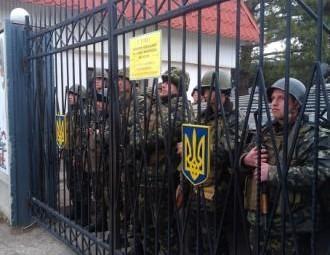Andrei Yahorau: The only option left for Kiev is to introduce the state of emergency
 photo by photo.vesti.ua
photo by photo.vesti.ua
Imposition of a state of emergency in Crimea will enable Ukraine to drive Russian troops out from the peninsula, as officially they are not present there.
Russian army has occupied Crimea and uses the peninsula as a springboard for further intervention to south-eastern parts of Ukraine. How can the Russian military intervention be stopped?
Andrei Yahorau, the Director of Centre for European Transformation, in the interview with the EuroBelarus Information Service considered different scenarios of situation development in Ukraine.
- Russian army has basically seized Crimea; however, its aims are now spread on south-eastern parts of Ukraine. What countermeasures can Ukrainian authorities undertake in respond to the actions of Russian soldiers?
- I think that the only option left for Kiev is to introduce the state of emergency and drive out Russian provocateurs from the southern regions of the country.
Russia doesn’t admit its military intervention and occupation of Crimea. In field conditions, when Russia refuses to negotiate and drive out its army, it’s the only option left for Ukraine.
- Will Kiev use weapon to return Crimea? As Ukrainian army is free to do anything with the armed “aliens”.
- Of course, Ukraine can try to free Crimea in the near future. There are no other left variants for Kiev. Moreover, Ukrainian authorities can ask the international community for help.
- In case of armed response there is a risk that the full-scale war on the part of Russia is announced. Will Ukrainian authorities take the risk and accept the loss of the peninsula in order to preserve the unity of the rest of Ukraine?
- When we talk about Crimea, it is also the southern parts of Ukraine that are at stake. War is the last thing to do. But if Russia doesn’t want to use diplomatic language, Ukraine has no other options left.
- Will the two sides change their strategy before the referendum assigned for March 16? Ukrainian authorities have suggested a compromise: referendum in Crimea in response to the military withdrawal of Russian army. This scenario allows both sides to save their face.
- Referendum in Crimea with observance of all democratic standards with no paramilitary groups of some other country at the Crimean territory is a quite civilized solution to the problem. Whereas the results of the referendum at gunpoint cannot be recognized by the world community. The variant with withdrawal of Russian army is indeed the civilized way to solve the problem.
- Will the Ukrainian armed forces manage to resist to the Russian aggressor on their own? Can Russian intervention be stopped by the armed resistance?
- If Russia continues with the policy it is pursuing now, Ukraine will have enough resources to free Ukraine from the “aliens”. If Russia gets involved in the full-scale war, Ukraine has no chances to resist the aggressor on its own. It all will depend on the readiness of the international community to resist the Russian intervention.
- European officials state that they are ready to immediately sign the political part of the EU association agreement with Ukraine. If it happens, Ukraine becomes part of Europe and has the right to rely on its military help. Why the agreement is not signed yet?
- Association agreement doesn’t mean that Ukraine becomes a EU member. Even if such agreement is signed, Ukraine can’t mobilize the military support of the European Union, as the EU will act basing on its own interests. Thus, when it comes to military cooperation EU Association Agreement gives no advantage to Ukraine.
- What is the most feasible scenario of events in Ukraine?
- It is hard to make predictions. For now there is still possibility of the diplomatic settlement of the conflict. It is unclear how far can Russia go, and how great IS the determination of Ukraine and the world community to resist the aggressor.
Situation remains unstable. We can only hope that the common sense will triumph and the crisis will be resolved through diplomatic channels.
-
03.01
-
07.10
-
22.09
-
17.08
-
12.08
-
30.09










































